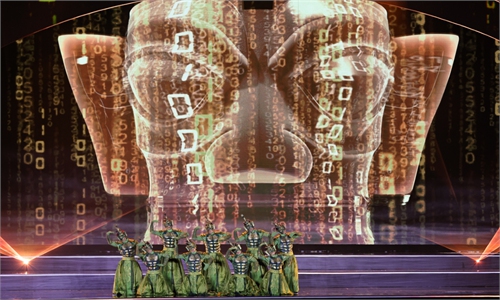
Illustration:Liu Xiangya/GT
The renowned World Science Fiction Convention, an event with over 80 years of history, made its debut in China this week in Chengdu, capital of Southwest China's Sichuan Province, allowing the world to discover the vibrant and forward-looking science fiction community in the country.Chengdu's bid for the hosting rights was confirmed in 2021. As the birthplace of the world's largest-circulation science fiction magazine Science Fiction World, which originally published Chinese novelist Liu Cixin's masterpiece The Three-Body Problem at the beginning of the 21st century, Chengdu has also witnessed the growth of China's sci-fi industry.
Chengdu's successful bid, making it the second city in Asia to host WorldCon after Yokohama, Japan, in 2007, lies not only in the city's efforts but also the development of China's sci-fi industry, especially after the novel The Three-Body Problem won the prestigious Hugo Award for Best Novel in 2015.
According to Liu, the most significant opportunity for the development of Chinese sci-fi lies in the nation's own growth rather than any authors. When China can leverage its rapid development to create a future that is even more appealing, it provides the most substantial support and foundation for the growth of Chinese sci-fi.
This year's WorldCon offers Chinese sci-fi enthusiasts a unique opportunity to participate in the world's premier platform for discourse on the genre, bridging the gap between China's rich sci-fi tradition and the global sci-fi community.
The majority of stories nowadays revolve around themes rooted in reality or history, while narratives exploring the development of future societies remain a rarity. However, given the rapid pace of artificial intelligence and societal evolution, sci-fi is emerging as the ideal genre for discussing our collective future.
The genre has attracted a vibrant audience of idealistic and passionate individuals, particularly among the younger generation. When these youthful idealists encounter a literary genre filled with the same ideals, the result is a potent fusion that can inspire them to strive for social progress and technological advancement.
China's development route provides a fertile landscape for the imagination of sci-fi writers and enthusiasts. With advancements in technology, space exploration and environmental sustainability, China is rapidly evolving into a society that captures the essence of many sci-fi dreams. These technological milestones and aspirations are often featured prominently in the works of modern-day sci-fi authors.
The Three-Body Problem, the first book in Liu's famed Three-Body trilogy, is a perfect example of how Chinese sci-fi has transcended national borders. The novel's international success and its adaptation into television series demonstrate how sci-fi can serve as a bridge for cross-cultural dialogues and fostering a global understanding of China's burgeoning sci-fi community.
The influence of sci-fi on society is not limited to readers and viewers but extends to aspiring scientists, inventors, and visionaries. The sci-fi genre can fuel people's imagination, fostering a spirit of exploration and innovation. As theoretical physicist Albert Einstein once said, "imagination is more important than knowledge." It is important to have thought-provoking concepts presented in sci-fi, as they can encourage young minds to ponder the possibilities of the future.
China, with its vast pool of talented scientists and engineers, is well-positioned to leverage this creative energy to make these fictional worlds a reality. Initiatives such as the China National Space Administration's ambitious space programs such as Tiangong space station and Mars exploration, the development of quantum communication technology, and the creation of eco-friendly urban environments bear witness to this transformation of sci-fi concepts into tangible progress.
Though it is still early to say sci-fi is a dominating force in China's cultural landscape, the WorldCon could signal a strong emphasis on innovative and forward-looking storytelling, besides traditional narratives rooted in history and tradition.
This evolution is integral to shaping China's identity as a global cultural force, one that respects its rich history while also embracing the limitless potential of the future.
The synergy between sci-fi and social development is not a one-way road. Just as sci-fi is shaped by its societal context, it, in return, influences society. The genre provides a unique platform for envisioning the future. By creating thought-provoking narratives that delve into the ethical, moral, and technological challenges that lie ahead, Chinese sci-fi could become a catalyst for social reflection and progress.
The global sci-fi community recognizes that China's contributions are not limited to technological advancements but also extend to the realm of ideas, where the nation's storytellers and visionaries share their unique perspectives on the future. The WorldCon's debut in Chengdu also signifies cross-cultural collaboration and understanding, allowing the world to discover the vibrant and forward-looking Chinese sci-fi community.
Language might be a barrier for domestic sci-fi to be known globally, as it is the case for many other authors from non-English speaking countries whose works deserve credit but have yet to be unveiled to the wilder audiences. But language should never be a barricade in fostering domestic sci-fi works.
The rise of Chinese sci-fi reflects the nation's evolving narrative from a land steeped in tradition to one brimming with innovation. As China undergoes development, sci-fi serves as a bridge between imagination and reality. By fostering a culture of innovation, China could also contribute to shaping the future, embracing the boundless possibilities that sci-fi offers.
The author is a reporter with the Global Times. life@globaltimes.com.cn



